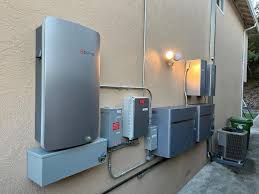Introduction: Stay Powered, No Matter What
Picture this: a storm knocks out the power. The lights go off, your fridge stops running, your internet crashes and everything comes to a standstill. Now imagine something better: the lights stay on, your food stays cold, your Wi-Fi is working, and life goes on like nothing happened. That’s what a home battery backup can do.Whether you work from home, want to protect your family during emergencies, or just want freedom from the power company, home battery systems give you peace of mind, reliable energy, and smart savings all without making a sound.
What Is a Home Battery Backup?
A home battery backup is a smart device that stores electricity for when you need it most. It can charge using power from solar panels or the grid, and it’s always ready to kick in when there’s a blackout or high energy demand.No noise. No fumes. No stress. These systems are clean, quiet, and built to power everything from lights and Wi-Fi to refrigerators and laptops.
Why You Need One
Here’s why more people are switching to battery backups:
1. No More Blackout Worries
Power outages are happening more often due to storms, heatwaves, and aging power lines. A battery keeps your lights on, your food safe, and your devices running automatically.
2. Energy Independence
When paired with solar panels, you can produce, store, and use your own power. No more being at the mercy of rising electricity bills or outages.
3. Stay Connected, Always
If you work from home or rely on internet access, even a short outage can ruin your day. A battery system makes sure your work, video calls, and streaming don’t skip a beat.
4. Eco-Friendly and Quiet
Forget noisy, gas-powered generators. Battery backups are green, silent, and emission-free, helping the planet while keeping your home powered.
How It Works
Here’s a simple breakdown of how a home battery system works:
- Charging: It stores energy from the grid or your solar panels.
- Monitoring: It watches for outages and tracks energy usage.
- Switching: If power goes out, it takes over in less than a second.
- Recharging: Once the power is back, it recharges for the next time.
You don’t have to lift a finger. It just works.
Whole-Home vs. Partial Backup
You can choose how much of your home to back up:
- Partial Backup: Powers essential items like lights, fridge, or medical devices. Best for smaller homes or tight budgets.
- Whole-Home Backup: Powers everything, including your AC, washer, TV, and more perfect for full peace of mind during long outages.
Brands like Anker SOLIX offer scalable solutions for both.
How to Choose the Right Battery System
Here’s what to keep in mind:
- Know What You Need
Decide if you just want to power the basics or your entire home. - Check Battery Capacity
Look for the kWh rating (kilowatt-hours). More kWh = more stored energy. For whole-home backup, aim for at least 10 kWh. - Consider Power Output
Can the battery handle heavy appliances like an oven or air conditioner? Make sure it matches your load needs. - Solar Compatibility
If you have or want solar panels, pick a battery that works well with solar systems. - Smart Features
Look for systems with apps or dashboards that show you how much energy you’re using, saving, and storing.
How Much Does It Cost?
A full home battery system usually costs between $10,000 to $25,000, depending on the size and features. That includes installation. While the upfront price might seem high, tax credits, rebates, and lower energy bills can make a big difference.Plus, you’re investing in comfort, safety, and long-term savings.
Installation and Maintenance
- Installed by Pros: Most systems are set up by certified experts in just a few days.
- Low Maintenance: No moving parts, no oil changes—just clean, quiet power.
- Long-Lasting: Top systems last 10–15 years or more.
- Expandable: Need more power later? Just add more batteries.
Extra Benefits
- Reduce your carbon footprint
- No fuel or refueling hassles
- Quiet operation no engine noise
- Peace of mind during heatwaves, storms, or winter freezes
- Boost your home’s value and resale appeal
FAQs
Is it really worth it?
Yes! If you deal with blackouts, work from home, or want clean backup power, it’s a smart and safe investment.
What’s the average cost?
Around $10k to $25k, depending on system size. Government incentives can reduce this cost by thousands.
How do I pick the best system?
Think about your energy needs, solar plans, and budget. Then compare brands based on capacity, output, reviews, and smart features.
Final Thoughts
Power outages don’t have to stop your life. With a reliable home battery backup, you can stay safe, connected, and in control no matter what the weather or grid throws your way.
Want a solution that’s smart, powerful, and solar-ready? Check out top-rated systems from Anker SOLIX and take the next step toward energy freedom today.

